Redditor Furious At Her BF For Getting Her Dog High, Questions Their Whole Relationship
Taking care of a puppy is a big responsibility, and you need support from the people around you. What happens if you don't?
Well, read this story. OP (27F) and her BF (33M) have the "cutest Pitbull" (1F).
They live in a 1BdRm apartment, and OP works from home, so the pup gets a lot of walks, spends a few days out of the week with other pups in daycare, and goes to the dog park several times a week. She's very well-loved and gets plenty of time being socialized.
However, OP's pup is still kind of a puppy and sometimes chews on things like chargers, chapstick, lighters, napkins, knitting needles, etc. When OP catches her in the act, she reprimands and corrects her immediately but can't scold her if she finds something hours later.
She does her best to baby-proof the house and keep her entertained, but her boyfriend has never had a dog and sometimes leaves things around. OP has had to remind him to clean up and pick things up, and he insists that she should train the pup not to do that.
OP was scared for her pup one morning when she seemed off-balance and lethargic and was leaking urine all over the apartment. It turned out that she had gotten into an ashtray on the floor in the bedroom and gotten high.
The vet said it happens more often than people think and not to worry, but OP was annoyed that her BF had caused it despite her reminders to be careful. She loves her pup like her own child and can't shake the feeling that this was easily preventable.
OP is wondering if she is being unreasonable in her annoyance or if she should just let it go.
OP asks:

OP (27F) and her BF (33M) have the "cutest Pitbull" (1F).

The dog is still a puppy and does.... well, puppy stuff
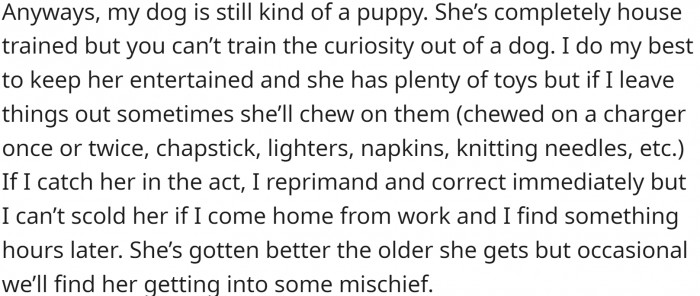
Understanding Behavioral Boundaries in Relationships
Behavioral boundaries are crucial in maintaining healthy relationships, especially when it comes to the well-being of pets. Research from the Journal of Interpersonal Violence suggests that clear boundaries can prevent misunderstandings and promote respect between partners.
In this case, the girlfriend’s anger towards her boyfriend for getting their dog high indicates a breach of trust regarding personal values and the ethical treatment of animals.
Understanding Boundaries and Respect
The incident involving the boyfriend getting the girlfriend's dog high underscores the importance of boundaries in relationships. According to research from the Journal of Family Psychology, respecting personal boundaries is crucial for maintaining trust and emotional safety in any relationship. In this case, the boyfriend’s actions not only disregarded the girlfriend's feelings but also compromised her sense of safety regarding her pet, which can evoke strong emotional reactions and a sense of betrayal.
Understanding the significance of boundaries can help partners navigate conflicts more effectively.
Her BF is not helping
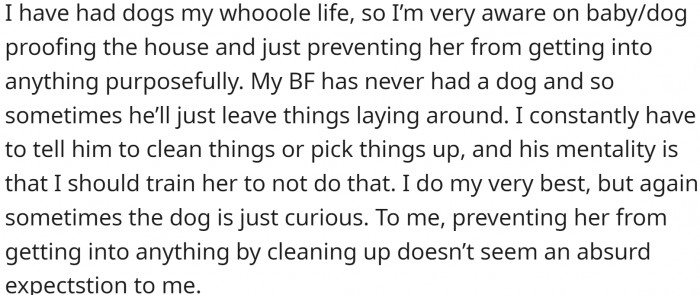
OP noticed her dog being lethargic. It turned out that it got into the boyfriend's stash he left on the floor.
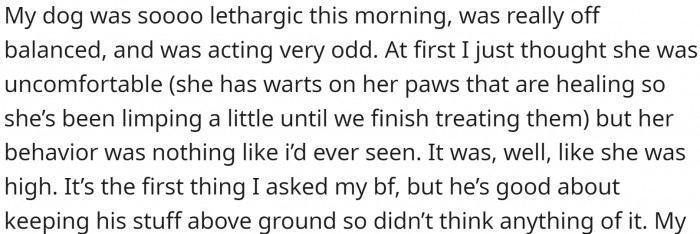
OP took it to the vet.
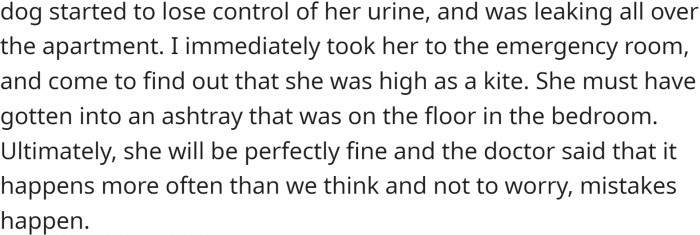
Moreover, the emotional responses triggered by such incidents can be intense, often rooted in past experiences and attachment styles. A study from the University of Minnesota found that individuals with anxious attachment styles are more likely to react strongly to perceived threats to their values.
This could explain the girlfriend’s outrage, as her bond with her dog likely carries significant emotional weight.
Moreover, this situation reveals the potential for conflict when one partner acts without considering the other's emotional responses. Research indicates that emotional intelligence plays a key role in relationship satisfaction. A study published in the Journal of Personality and Social Psychology demonstrates that individuals with higher emotional intelligence are better equipped to navigate interpersonal conflicts, as they can empathize with their partner's feelings and make more considerate choices.
The dog will be fine.

But OP is angry because all this was easily preventable.

OP has offered the following explanation for why they think they might be the asshole:
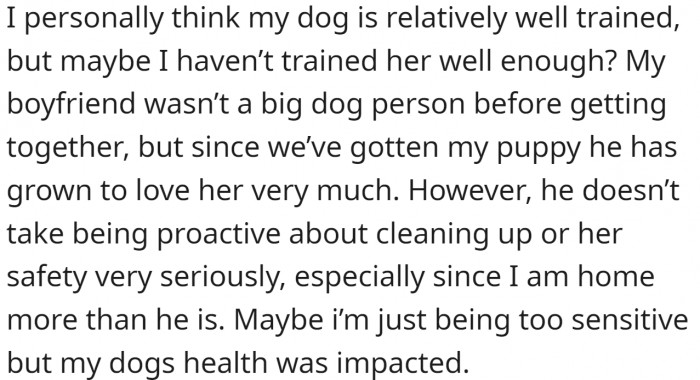
The Role of Empathy in Conflict Resolution
Empathy is a critical component in resolving conflicts within relationships. Research shows that when partners actively listen and validate each other's feelings, it fosters a sense of safety and connection.
The boyfriend might benefit from acknowledging his girlfriend’s feelings about the situation and expressing understanding for her emotional reaction. This can create a collaborative environment for addressing the issue.
The Role of Emotional Responses in Relationships
Emotional responses are often heightened in relationships, particularly when pets are involved. Pets can be viewed as family members, and any perceived threat to their well-being can lead to intense emotional reactions. According to Dr. David Levy, a psychologist specializing in human-animal interactions, the bond between humans and their pets can evoke feelings of protectiveness and love, making incidents like this particularly distressing for pet owners. Understanding the emotional significance of pets can help partners navigate conflicts more compassionately.
In this case, the girlfriend's anger is a valid emotional response to what she perceives as a threat to her dog's well-being.
Redditors spoke their mind:
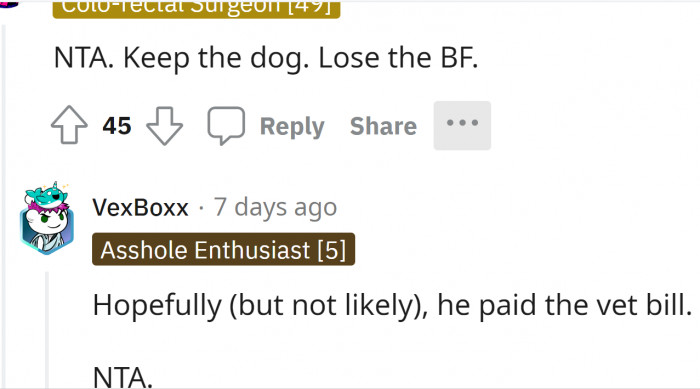
OP should think some things through

BF couldn't even apologize for being wrong.

Additionally, discussing the underlying motivations behind behaviors can provide clarity in relationships. A study from Stanford University suggests that exploring the reasons behind actions can lead to greater understanding and reduce conflict.
In this case, the boyfriend could discuss his intentions behind the action, which may help in mitigating the girlfriend’s anger.
Additionally, exploring the concept of emotional safety is vital in this context. Emotional safety refers to the ability to express thoughts and feelings without fear of judgment or harm. Research suggests that creating a safe emotional environment is essential for fostering open communication and resolving conflicts. The boyfriend's actions may have undermined this safety, leading to a breakdown in trust and communication between the couple.
We don't know how weed affects dogs
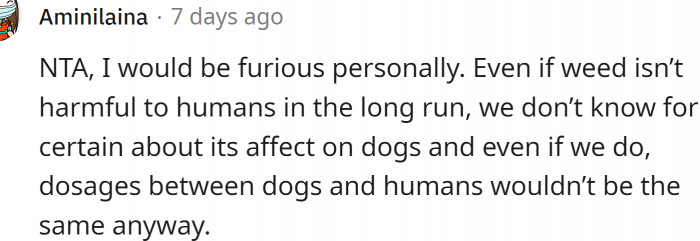
BF is so very lazy and irresponsible
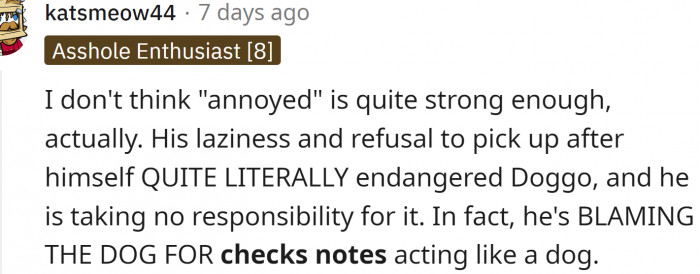
This Redditor has a point:

Navigating Complex Emotions in Relationships
Emotions can be complex, especially when they involve our pets. Research indicates that pet ownership often enhances emotional bonds, making any perceived threat to that bond particularly distressing.
The girlfriend’s reaction could be understood as a protective response to what she perceives as a threat to her pet’s safety and well-being.
Constructive Communication Strategies
To repair the relationship after such an incident, constructive communication strategies are essential. Couples can benefit from engaging in open dialogues about their feelings and expectations. Research indicates that using 'I' statements can facilitate more effective communication by focusing on personal feelings rather than accusations. For example, the girlfriend might express, 'I felt anxious when I saw my dog in that situation,' instead of placing blame on the boyfriend.
This approach fosters empathy and understanding, paving the way for resolution.
Taking care of a puppy is a big responsibility because they are still learning and don't always understand the consequences of their actions. As a result, they can be prone to making mistakes and doing seemingly silly things, such as chewing on furniture, urinating in the house, or barking excessively.
As their guardian, it is your responsibility to provide them with guidance, discipline, and training to help them learn the rules and regulations of your home. Additionally, puppies require a lot of attention and care, from regular vet check-ups to proper feeding and exercise.
In short, taking care of a puppy is not a decision to be taken lightly, as it requires dedication and commitment to ensure your pet's safety, health, and well-being.
Moreover, the couple might consider establishing clear boundaries regarding pet care in the future. Research emphasizes that setting boundaries is crucial in protecting emotional well-being and maintaining healthy relationships. By discussing and agreeing upon guidelines for pet interactions, both partners can feel more secure and respected in their preferences.
Addressing Underlying Issues
Lastly, it’s important to address any underlying issues that may contribute to the conflict. Psychological research suggests that unresolved personal anxieties can spill over into relationships, leading to heightened emotional reactions. The girlfriend may benefit from reflecting on her feelings and exploring the root of her anxiety regarding her pet's safety. Engaging in self-reflection can help her communicate her needs more clearly and prevent similar conflicts in the future.
Psychological Analysis
This situation illustrates how conflicts regarding pets can evoke strong emotional reactions. It's essential for partners to respect each other's feelings and establish clear boundaries to maintain trust and emotional safety within the relationship.
Analysis generated by AI
Analysis & Alternative Approaches
In conclusion, navigating conflicts involving pets requires a deep understanding of emotional boundaries and respect. Research highlights the importance of effective communication and emotional safety in fostering healthy relationships. By establishing clear boundaries and engaging in constructive dialogues, couples can resolve conflicts and strengthen their connection.
Moreover, establishing clear guidelines for pet care can help prevent future conflicts. A study from the Journal of Applied Animal Behavior Science emphasizes that creating mutually agreed-upon rules regarding pet care can enhance relationship satisfaction.
This could involve setting boundaries around what is acceptable behavior with their pets, ensuring both partners feel respected and valued.
The Importance of Open Communication
Open communication is vital in addressing conflicts in relationships. Research from the American Journal of Psychology suggests that regular conversations about feelings and expectations can prevent misunderstandings.
Encouraging both partners to share their thoughts and feelings about pet care can create a more harmonious living environment, reducing the likelihood of escalated conflicts.
Ultimately, fostering a culture of respect and understanding around pet ownership can enhance relationship dynamics. According to findings from the Journal of Marriage and Family, couples who prioritize empathy and open communication regarding their pets report greater satisfaction in their relationships.
By working together, partners can navigate these challenges more effectively and strengthen their bond.
Analysis & Alternative Approaches
In conclusion, navigating conflicts involving pets requires empathy, communication, and clear boundaries. Research highlights the importance of addressing feelings openly to foster a supportive environment for both partners and their beloved animals.
By prioritizing understanding and collaboration, couples can enhance their relationship while ensuring the well-being of their pets.



